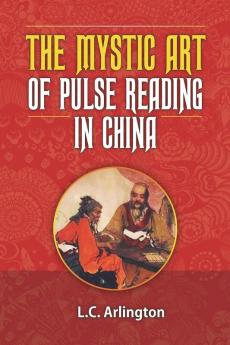English
Paperback
₹1043
₹1061
1.7% OFF
(All inclusive*)
Delivery Options
Please enter pincode to check delivery time.
*COD & Shipping Charges may apply on certain items.
Review final details at checkout.
Looking to place a bulk order? SUBMIT DETAILS
About The Book
Description
Author
<p>Lewis Charles Arlington, (author of In Search of Old Peking) is an American who worked in Beijing at the end of the Qing and the beginning of the Republic of China. In this essay he attempted to introduce the subject of Chinese pulses to a western audience. Strictly judging from the medical content of his work, his recitation of the various Chinese pulses is commendable as a quick summary of the basic information on the subject. Although it is not a comprehensive study of pulses that could be used to guide clinical treatment, it provides a glimpse into the vast and complex subject through western eyes.</p><p><br></p><p>This version of his article had been skillfully edited to remove Arlington's obvious biases against Chinese medicine and the Chinese culture. By doing so we are left with a text that conveys a basic understanding of pulses that allows the lay person to gain an understanding of this complex field of Traditional Chinese Medicine.</p><p><br></p><p>Arlington wrote his original text at a time when doctors in the west still believed that syphilis was due to the degeneration of the thyroid gland and not -as we know today- a <em>Treponema pallidum</em> infection. The author's overconfidence in the superiority of his erroneous beliefs over the Chinese theories is a timely reminder that in science there are no absolutes. With Chinese medicine becoming massively popular worldwide and with the advancements of conventional medicine, some of the author's rudest comments are now quite embarrassing and fortunately are removed from this edition. </p><p><br></p><p>In regards to the 21<sup>st</sup> century, it's very disconcerting that Arlington's terms such as "quackery" used in the text to describe Chinese medicine could also very well portray many of the early 20<sup>th</sup> century western practices. It's also very disturbing that the same term still persists in current literature although clinical evidence to the contrary has become abundant. </p><p><br></p><p>The editing and publication of this text by Mark Linden O'Meara comes at a time when it's important to look back and re-examine the relentless criticism that Chinese medicine had to face even before Nixon's historic trip to China, and also ascertain that modern arguments are often no better than Arlington's imperialist attempts to vilification.</p>
Delivery Options
Please enter pincode to check delivery time.
*COD & Shipping Charges may apply on certain items.
Review final details at checkout.
Details
ISBN 13
9781927077481
Publication Date
-14-07-2023
Pages
-32
Weight
-59 grams
Dimensions
-152x229x1.68 mm








